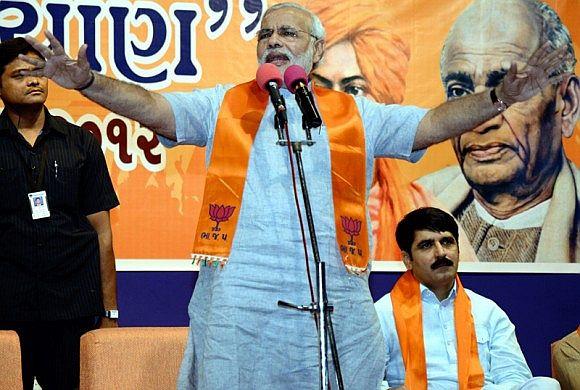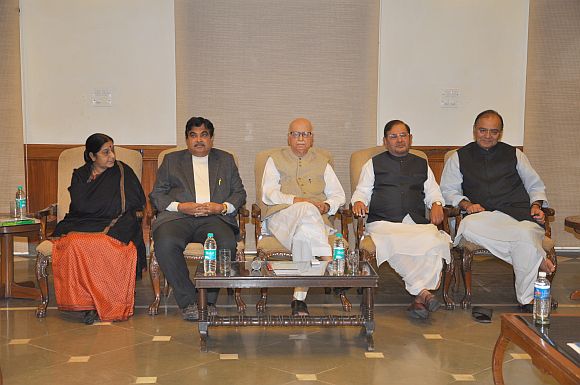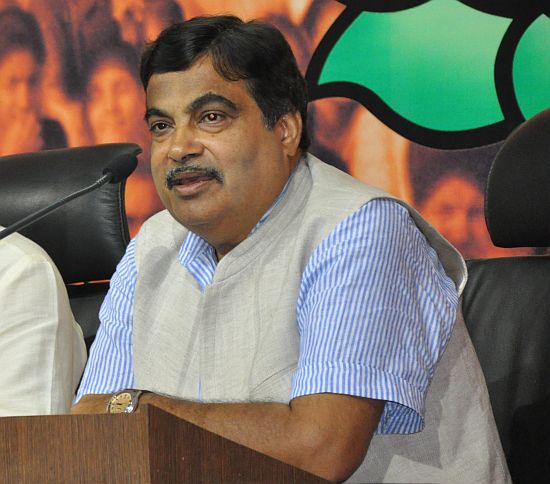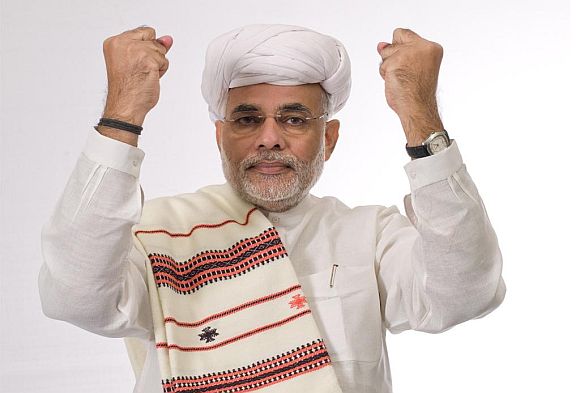
There is a whiff of desperation to the rush of endorsements Modi has received. It is also true that it makes some BJP allies in the National Democratic Alliance -- and potential allies – uncomfortable, says Business Standard in its editorial
The release of the election manifesto for the Bharatiya Janata Party in Gujarat by Chief Minister Narendra Modi is a good point at which to take stock of his growing stature within his party even before he wins the coming assembly elections, as is expected.
Gujarat Election Coverage | Check out the Rediff forecast
The past few days have seen a cascade of endorsements of Modi's prime ministerial aspirations from all corners of the BJP.
Its leader in the Lok Sabha, Sushma Swaraj, said over the weekend that Modi was "capable of" being and "fit to become prime minister".
Her Rajya Sabha counterpart, Arun Jaitley, said it was "natural" the BJP keep Modi "ahead" of other aspirants.
Other leaders, such as Gopinath Munde and Venkaiah Naidu, have expressed similar sentiments.
Click on NEXT to read further...

Even former prime ministerial candidate L K Advani said recently of Modi that "in a family sometimes the younger ones are more capable than the seniors and, in such a case, seniors do not feel bad, they feel happy that a youth from their family is so capable".
There is no word yet from Nagpur on how the leadership of the BJP's parent organisation, the Rashtriya Swayamsevak Sangh, feels about these developments; but it is increasingly possible that RSS leaders will have to accept Modi's coronation as fait accompli.
The manifesto that Modi released is also, in its own way, significant.
Most intriguing from the point of view of reform is Modi's identification of what he called the "neo-middle class", by which he meant those people just above the poverty line, but not quite in the middle class.
The thrust of his speech and his manifesto was that, in effect, government welfare schemes would be expanded to ensure that they reached this "neo-middle class".
Click on NEXT to read further...

It is possible to imagine this as a response to an increasingly aspirational and less poor India.
However, it is hard to classify a welfare expansion and a redefinition of people from "above poverty line" to "neo-middle class" as automatically reformist.
Indeed, the other big promise -- that the state government will pay as much as four per cent of the seven per cent interest on agricultural loans – is a retrograde step and poor policy.
Yet it is not because of his policy instincts that India's major opposition party is, effectively, closing ranks behind its most visible chief minister.
Although the ruling Congress and its United Progressive Alliance are in a mess of huge proportions, the BJP has been unable to capitalise on that.
Its leader, nominated by the RSS, is labouring under accusations of corruption.
Click on NEXT to read further...

Its most popular southern leader has dramatically left the party and taken a large chunk of Karnataka's votes with him.
And the leadership tangle in New Delhi has left the party paralysed over the past few years.
There is a whiff of desperation to the rush of endorsements Modi has received. It is also true that it makes some BJP allies in the National Democratic Alliance -- and potential allies -- uncomfortable.
Nitish Kumar's Janata Dal (United) immediately put the BJP to the question on Modi's position, causing Naidu to backtrack somewhat.
A BJP under Modi, defiantly divisive, will spell the end of the NDA as it was under Atal Bihari Vajpayee.